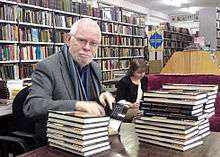Gerard Smyth
Gerard Smyth (born 1951) is an Irish poet, born in Dublin in 1951 and began publishing poetry in the late 1960s when his first poems were published by David Marcus in the New Irish Writing Page of The Irish Press and by James Simmons in The Honest Ulsterman.

New Writers’ Press published a limited edition small collection, The Flags Are Quiet, in 1969 and another limited, hand-printed edition, Twenty Poems in 1971, followed by Orchestra of Silence, a Tara Telephone publication, also in 1971. This early work – highly influenced by his reading of Dylan Thomas and Hopkins – also appeared in the Press's journal The Lace Curtain.
Smyth was born and grew up in the old Liberties area of the city which has influenced, and features in, much of the poetry he has written. It is the factor in his work that prompted the poet Michael Hartnett to say “Gerard Smyth is essentially a city-poet; lyrical, passionate, he may do for Dublin in verse what Joyce did for it in prose”. Another significant, but contrasting, landscape which frequently appears in his poems is the rural area of County Meath where he spent the summers of his childhood and teen years on the small farm on which his mother was born – and where he wrote his first poems at the age of sixteen. He has, up to the present time, maintained close contact with this ancestral ground of his maternal family's past.
Smyth has worked all his professional life as a journalist with The Irish Times with responsibility for arts coverage. He was the newspaper's poetry critic for several years in the late 1970s. He is currently the newspaper's poetry editor.
He was elected a member of Aosdána in May 2009. In 2011 he received the O’Shaughnessy Poetry Award from University of St Thomas in St Paul, Minnesota. He is co-editor, with Pat Boran, of “If Ever You Go: A Map of Dublin in Poetry and Song” (Dedalus Press), published and chosen as Dublin's One City, One Book for 2014.
Smyth has participated in readings in such places as Marina Tsvetayev's house in Moscow, the Cafe de Flor in Paris, the Great Hall of Mirrors in Bucharest and Literaturwerkstatt in Berlin, as well as at most of Ireland's literary festivals including Cuirt, the Kilkenny Festival and Electric Picnic.
A poet of the mundane and the mysterious, a poet of the everyday and also of the eternal. – Dennis O’Driscoll
Smyth is a fine lyric poet…close to home in image and event. – Augustus Young, The Niagra Magazine (New York)
Smyth is a poet of uncommon and unnecessary humility; he holds his poems within strict limits, allowing them little occasion for grandeur or posture. Despite his scrupulous restraint in form, the phrasing frequently manifests a romantic richness which is in turn checked by the impersonality of voice sustained throughout all of these poems. – W J McCormack.[1]
Collections
The Flags Are Quiet, New Writers’ Press, 1969
Twenty Poems, New Writers’ Press, 1970.
Orchestra of Silence, Gallery Press, 1971.
World Without End, New Writers Press, 1977
Loss and Gain, Raven Arts Press, 1981
Painting the Pink Roses Black, Dedalus Press, 1986
Daytime Sleeper, Dedalus Press, 2002
A New Tenancy, Dedalus Press, 2004
The Mirror Tent, Dedalus Press, 2007
The Fullness of Time: New and Selected Poems, Dedalus Press, 2010
We Like it Here Beside the River, Hand-printed limited edition by The Salvage Press, 2014.
A Song of Elsewhere, Dedalus Press, 2014
He has contributed widely to literary magazines in Ireland, Britain and North America and has been translated into Spanish, Polish, Hungarian and Romanian. He has read his work on The Enchanted Way, Sunday Miscellany and The Arts Show on RTE Radio.
References
- "Biography". Retrieved 4 May 2016.